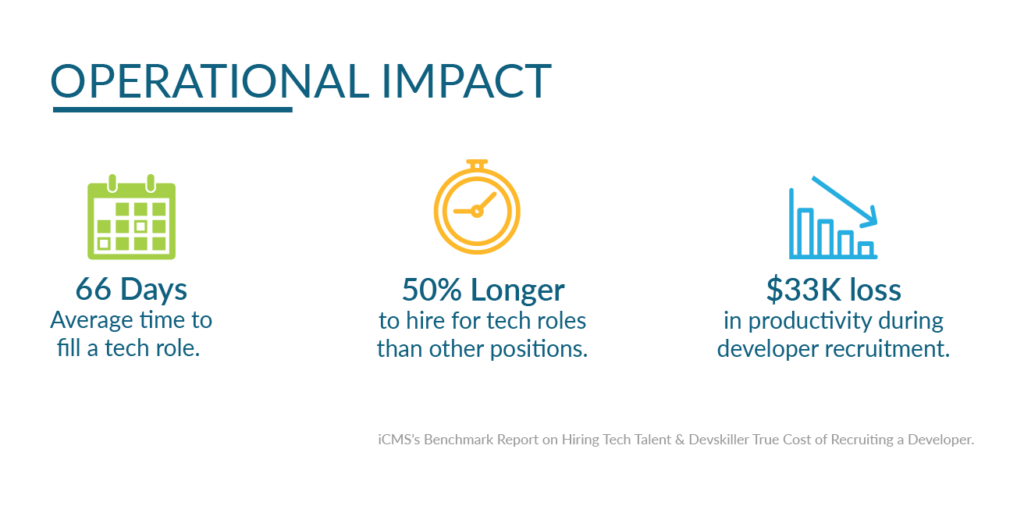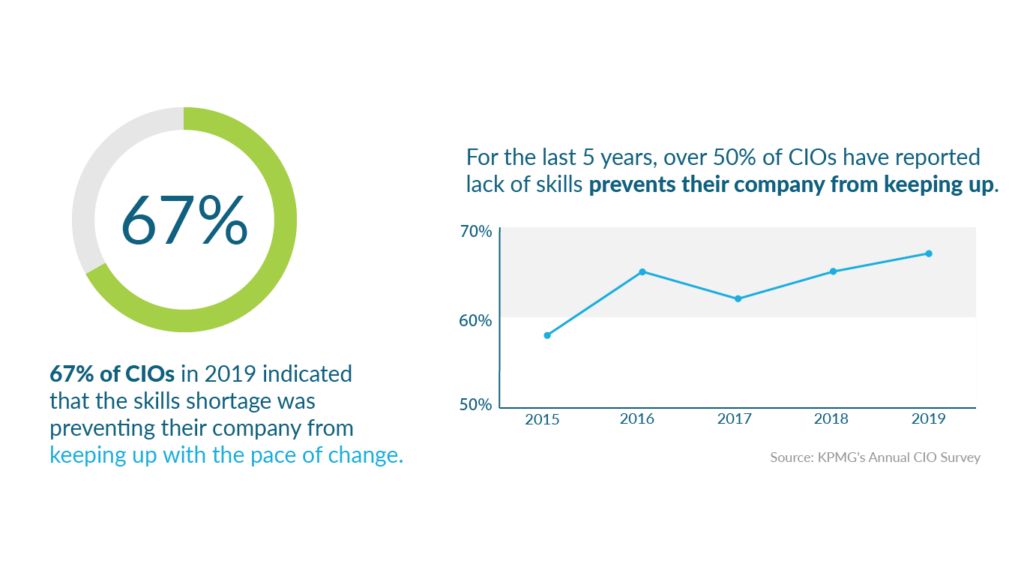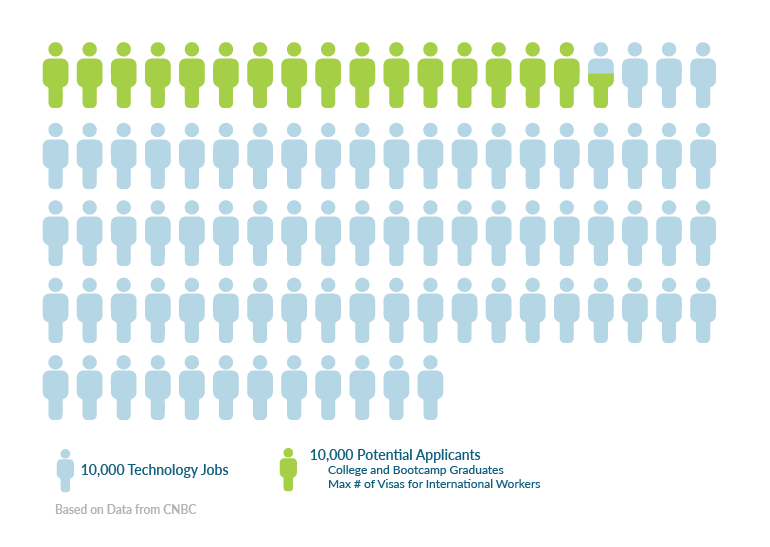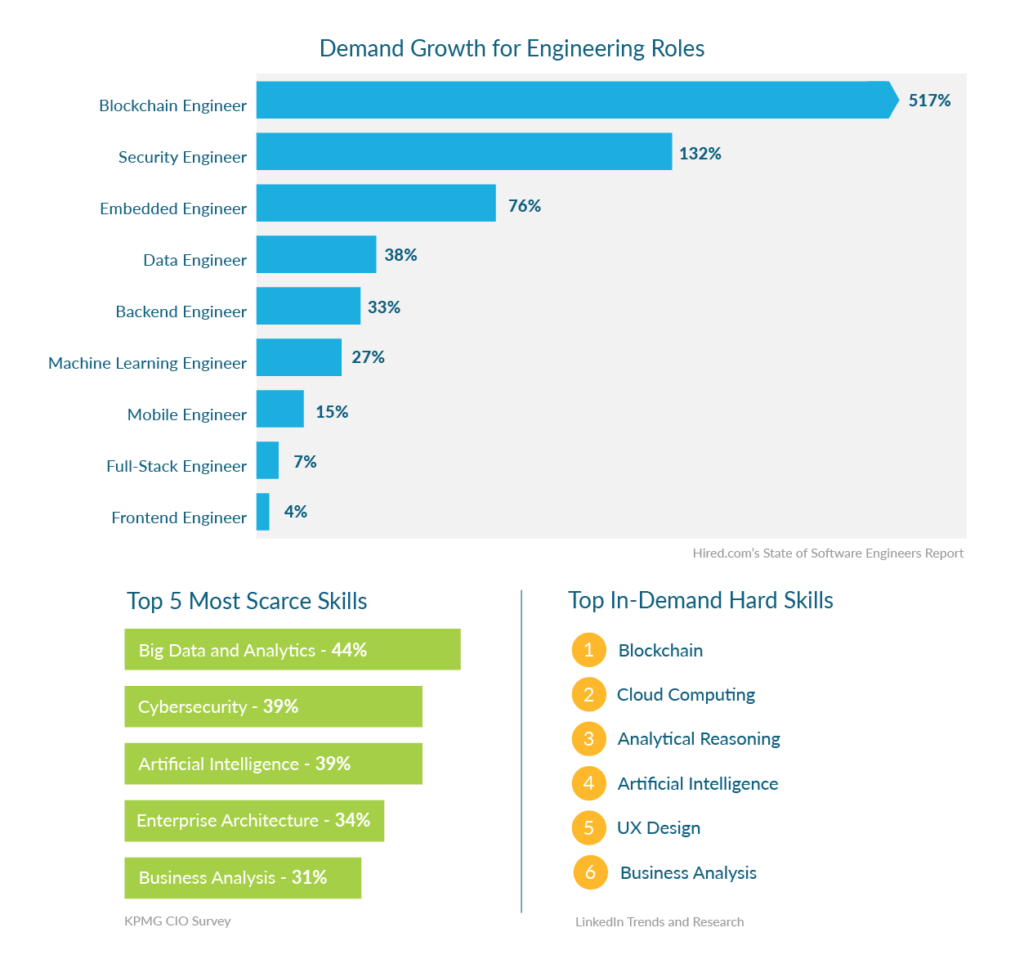A shortage of software engineers is not breaking news. For years, the IT Talent crisis and reports of 700,000+ unfilled tech jobs in the U.S. have saturated industry news.
Need a team to help you scale software development or testing?
Take a look at Gartner’s emerging risks report. In Quarter 3 of 2018, Garter reported “talent shortage” as one of the top 5 emerging risks that organizations face globally. The risk topped the list the following quarter and remained in the top 5 for four consecutive quarters. (Once a risk has been in the top for 4 consecutive quarters, it’s no longer considered “emerging” and removed.)

Despite the consistent concern, the tech talent gap remains a top pain point for organizations.
The Impact of the Shortage of Software Engineers on Businesses
But, how exactly does the talent gap affect your business?
Of course, there are operational implications, affecting hiring timelines and budget.

If these effects are not compelling enough, perhaps a more striking concern is that the shortage of skilled software engineers is halting innovation and affecting business growth.

In today’s saturated marketplace, the inability to respond to market changes and customer demands can be ruinous.
What is causing the shortage of software engineers?
Looking at the data, it appears to be pretty straightforward: there are more technology positions open than there are engineers to fill them.
Specifically, there are over 920,000 unfilled engineering positions in the US and only 165,000 potential applicants.
These numbers are insights from CNBC. In November 2019, they reported an estimated 920,000 unfilled tech openings from July – October. They then compared that data to the total potential applicant pool which included annual graduates from computer science programs and coding boot camps and the maximum number of allotted visas for international workers to fill the roles. Even still, there were just over 165,000 potential applicants.

Ok, it seems clear enough. But if you dive deeper into those numbers you will find things are a bit more complicated than that.
So why do over 700,000 technology positions remain unfilled?
The shortage of software engineers is not because of an overall shortage of talent. Rather, there is a shortage of qualified engineering talent.
We see this play out 2 ways: specific positions that are particularly difficult to fill and the scarcity of in-demand skills. Comparing the most difficult to hire jobs to the most in-demand and scarce skills, there is a clear parallel between missing skills and hiring difficulty.

Notice anything else about these in-demand skills? They correlate with the latest emerging technologies and new, trendy tech languages. We are confident in predicting that as new technology trends emerge, these hard-to-fill jobs will follow suit.
Why? Well for skills like AI, BlockChain, Cybersecurity, etc., you’ll be hard-pressed to find an engineer that can just “wing it.” These positions require specific skills and languages that take education and practice to refine.
And unfortunately, the tech world moves faster than the ivory tower. So, education (both formal institutions and more recent solutions, like boot camps) are playing catch up.
This leaves business scrambling to get ahead of the latest technologies and fighting for the same few engineers that have the right skillset.
Which companies win these in-demand engineers?
Companies that have the prestige and budget to attract these recruits are getting first dibs.
When competing for cutting edge talent with the likes of Google, Apple, and IBM, smaller companies rarely win out.
And this doesn’t just apply to the Technology industry. Other industries like Healthcare, Finance, and Retail also have skin in the game as they attempt to stay relevant by developing new technologies and reinventing their services to keep up with their evolving customer demands.
How can you get ahead of the talent shortage?
Didn’t think we’d leave you hanging, did you? Lucky for you, partnering with companies like KMS puts you at an advantage.
By leveraging outsourcing, you can tap into a whole new talent pool. And since you are not competing with some of the Western tech giants, you have access to the top engineers globally.
Other companies see the potential too. According to KPMG’s 2019 CIO Survey, 41% of organizations were planning to increase their outsourcing spend.
Close the talent gap and cut costs? It’s a win-win.
Ready to supplement your team with Vietnam’s top talent?

Curious to know more about how outsourcing benefits your bottom line? Check out the Economics of Outsourcing.